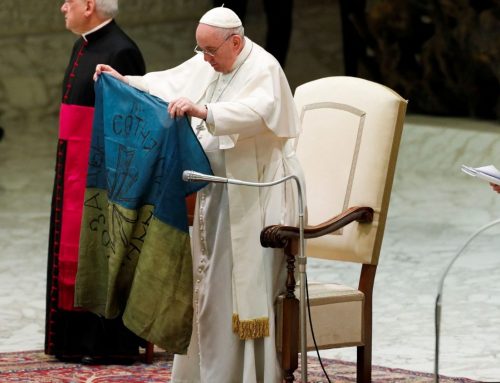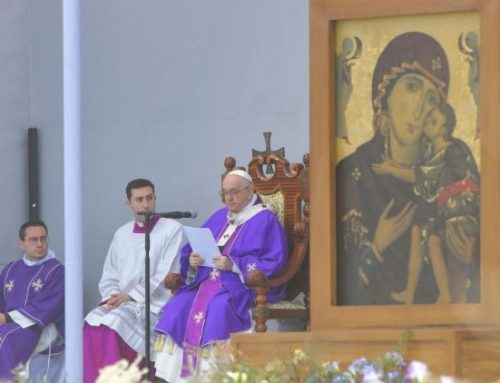“A family that almost never eats together, or that does not speak at the table, but watches television, or looks at smartphones, is a family that is ‘very little a family”
“A family that almost never eats together, or that does not speak at the table, but watches television, or looks at smartphones, is a family that is ‘very little a family”
Dear Brothers and Sisters, good morning!
During these days the Church of Italy is holding its National Congress at Florence — the Cardinals, Bishops, consecrated, and laymen all together. I invite you to pray a Hail Mary to Our Lady for them [Hail Mary].
Today we will reflect on a characteristic quality of family life, which is learned from the first years of life: fellowship, that is, the attitude of sharing the goods of life and of being happy to be able to do so. To share and to be able to share is a valuable virtue! Its symbol, its “icon” is the family gathered around the domestic table. The sharing of a meal — and, therefore, in addition to food, also affections, the recounting of events –is a fundamental experience. When there is a celebration, a birthday, an anniversary, it finds us around the table. In some cultures it is typical to do this also when mourning, to be close to one in sorrow because of the loss of a relative.
Fellowship is a sure thermometer to measure the health of relations: if there is in the family something that is not well, or some hidden wound, at the table it is immediately understood. A family that almost never eats together, or that does not speak at the table, but watches television, or looks at smartphones, is a family that is “very little a family.” When children are attached to their computers at the table, to mobile phones, and do not listen to one another, this is not a family, it is a boarding house.
Christianity has a special vocation to fellowship; everyone knows it. The Lord Jesus gladly taught at the table, and sometimes represented the Kingdom of God as a festive invitation. Jesus chose the table also to give his disciples his spiritual testament – he did so at supper – condensed in the memorial gesture of His Sacrifice: gift of His Body and of His Blood as food and drink of salvation, which nourish true and lasting love.
In this perspective, we can well say that the family is “at home” at Mass, precisely because it brings to the Eucharist its own experience of fellowship and opens it to the grace of a universal fellowship, of the love of God for the world.
By participating in the Eucharist, the family is purified from the temptation to shut itself in on itself, fortified in love and fidelity, and stretches the limits of its fraternity according to Christ’s heart.
In this our time, marked by so many closures and too many walls, fellowship, generated by the family and dilated by the Eucharist, becomes a crucial opportunity. The Eucharist and the families nourished by it can surmount the closures and build bridges of hospitality and charity. Yes, the Eucharist of a Church of families, capable of restoring to the community the active leaven of fellowship and mutual hospitality, is a school of human inclusion that is not afraid of confrontations! There are no little ones, orphans, weak ones, vulnerable ones, wounded and disappointed ones, desperate and abandoned ones that the Eucharistic fellowship of families is not able to nourish, refresh, protect and host.
The memory of family virtues helps us to understand. We ourselves have known, and still know, what miracles can happen when a mother has eyes and attention, care giving and care for children other than her own. Up to yesterday, one mother was enough for all the children of the yard! And yet: we know well what strength a people acquire whose parents are ready to move to protect everyone’s children, because they regard children as a joint good, that they are happy and proud to protect.
Today many social contexts put obstacles to family fellowship. It’s true; today it’s not easy. We must find the way to recover it. One speaks at table, one listens at table. There is no silence, that silence that is not the silence of nuns but the silence of egoism, where every one makes do for himself, or there is the television or the computer … and there is no talking. No, no silence. We must recover that family fellowship although adapting it to the times. It seems that fellowship has become something that is bought and sold, but then it’s something else. And nourishment is not always the symbol of a just sharing of goods, capable of reaching one who does not have bread or affections. In rich countries we are induced to spending for excessive nourishment, and then we are also induced to remedy the excess. And this foolish “business” takes away our attention from real hunger, of the body and of the soul. When there is no fellowship there is egoism, each one thinks of himself. So much so that advertising has reduced it to a weakness for snacks and a desire for sweets. While so many, too many brothers and sisters, remain outside the table. It is somewhat shameful!
Let us look at the mystery of the Eucharistic banquet. The Lord breaks His Body and sheds His Blood for all. Truly, there is no division that can resist this Sacrifice of communion: only a false attitude, of complicity with evil, can exclude from it. Every other distance cannot resist the vulnerable power of the broken bread and poured wine, Sacrament of the one Body of the Lord.
The living and vital alliance of the family, which precedes, supports and embraces, in the dynamism of its hospitality, the daily toils and joys, cooperates with the grace of the Eucharist, which is able to create ever new communion with the strength that includes and saves.
In fact a Christian family will show precisely in this way the breadth of its true horizon, which is the horizon of the Mother Church of all men, of all the abandoned and the excluded, in all peoples.
Let us pray that this family fellowship will be able to grow and mature in the time of grace of the forthcoming Jubilee of Mercy.
Dear Brothers and Sisters: In our continuing catechesis on the family, today we consider the importance of togetherness. Sitting at table for the family dinner, sharing our meal and the experiences of our day, is a fundamental image of togetherness and solidarity. Because Jesus gave us the Eucharist as a meal, there is a close relationship between families and the Mass. The togetherness we experience in our families is meant, in the family of the Church, to extend to all as a sign of God’s universal love. In this way the Eucharist becomes a school of inclusion, in which we learn to be attentive to the needs of everyone. Sadly, the family meal, this great symbol of togetherness, is disappearing in some societies. Food itself, the very sign of our sharing with other, is wantonly wasted in some places, while our brothers and sisters go hungry in others. The Eucharist reminds us that our bread is meant to be shared with all. May our families, and the entire Church, be signs of togetherness and solidarity for the good of the whole human family, especially during the coming Jubilee of Mercy.
I greet the English-speaking pilgrims and visitors taking part in today’s Audience, including those from the United Kingdom, Denmark, the Netherlands, Ghana, Japan, Korea and the United States of America. Upon you and your families I invoke the Lord’s blessings of joy and peace. God bless you all!
A cordial welcome to the Italian-speaking pilgrims! I greet the Ecumenical Group of Farfa Sabina; the participants in the Meeting on Palliative Care; the Order of the Social Assistants and the Coordination of the Free Professional Associations.
Today we celebrate the Liturgical Memoria of Saint Martin, Bishop of Tours, a very popular figure especially in Europe, model of sharing with the poor. Next year, in happy coincidence with the Jubilee of Mercy, the 17th centenary of his birth will be observed.
I address a greeting to young people, the sick and newlyweds. May the Lord help you, dear young people, to be promoters of mercy and reconciliation; may He support you, dear sick, not to lose trust, not even in moments of harsh trial; and may He grant you, dear newlyweds, to find in the Gospel the joy of receiving every human life, above all the weak and vulnerable.
ZENIT







Leave A Comment
You must be logged in to post a comment.